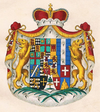Thurn und Taxis
| County of Thurn and Taxis | ||||||||
| Grafschaft Thurn und Taxis | ||||||||
| State of the Holy Roman Empire | ||||||||
|
||||||||
| Capital | Regensburg | |||||||
| Government | Principality | |||||||
| Historical era | Middle Ages | |||||||
| • | House raised to Briefadel | 1512 | ||||||
| • | Raised to Freiherren | 1608 | ||||||
| • | Hereditary Imperial Postmasters General |
1615 |
||||||
| • | Raised to County | 1624 | ||||||
| • | Granted princely rank in the Spanish Court |
1681 |
||||||
| • | Raised to Princely county | 1695 | ||||||
| • | Mediatised to Bavaria | 1806 | ||||||
| • |
Postal monopoly nationalised |
1867 |
||||||
|
||||||||
|
Thurn and Taxis |
|---|
 |
|
Extended family
|
The Princely House of Thurn and Taxis (German: das Fürstenhaus Thurn und Taxis, IPA: [ˈtuːɐ̯n ʊnt ˈtaksɪs]) is a German noble family that was a key player in the postal services in Europe in the 16th century and is well known as owners of breweries and builders of many castles.
The Tasso (from the Italian for "badger") were a Lombard family in the area of Bergamo. The earliest records place them in Almenno in the Val Brembana around c. 1200 before they fled to the more distant village of Cornello to escape feuding between Bergamo's Guelf Colleoni and the Ghibelline Suardi families. Around 1290, after Milan had conquered Bergamo, Omodeo Tasso organized 32 of his relatives into the Company of Couriers (Compagnia dei Corrieri) and linked Milan with Venice and Rome. The recipient of royal and papal patronage, his post riders were so comparatively efficient that they became known as bergamaschi throughout Italy.
...
Wikipedia

